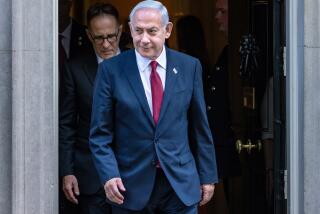Voices of Reform Heard in the Land : * Disgruntled Israelis Demanding Changes in System
- Share via
Israel prides itself on having the Middle East’s only functioning democracy, but it is a peculiar kind of democracy that virtually ignores any need for personal political accountability even as it has worked to promote increasingly ineffective government. Most politicians seem content with things as they are, but more and more of the public is now clamoring for change. Shameless efforts at vote-buying to form a new coalition after the collapse in March of the Labor-Likud “national unity” government caused an explosion of popular contempt and spurred calls for radical reform. Fears are being expressed that rising anger over a failed system could soon find anti-democratic expression.
Last month, 500,000 Israelis--more than 20% of the nation’s voters--signed petitions demanding reforms. That call, though, is likely to go unheeded by a Knesset whose 120 members are the chief beneficiaries of the status quo, and by party leaders who would lose vast powers should Israelis get a more direct voice in naming their leaders.
Israel’s essential political problem is its system of proportional representation--unique in the world--under which voters cast their ballots for a national list of candidates chosen by party central committees, instead of for individuals competing in separate districts. This system insulates elected officials, leaving them unresponsive and unanswerable to constituents. The system also inevitably encourages a multiplicity of parties, some of which--the religious parties especially--have always enjoyed undue influence in the formation of coalition governments. The practical results are apparent; the more diverse the interests that must be catered to, the less coherent and decisive a government’s policies are likely to be.
In the 1988 election, 15 parties out of the 27 that competed got enough support--about 22,000 votes is all it takes to win a Knesset seat--to be represented in Parliament. Labor and Likud between them hold just under two-thirds of those seats, but the collapse of their coalition has again given the smaller parties a chance to hold the balance of power.
So far, neither major party has been able to create a new coalition. The best hope for breaking the impasse would seem to lie in new national elections. But elections in the absence of reform would almost surely produce the same inconclusive results that have for so long plagued the country, and the same near-paralysis in decision-making that frustrates so many Israeli voters and disturbs Israel’s closest ally.
What reforms are most needed? The most important is to move from a single national constituency to many regional constituencies, so that voters could have a direct say in choosing their representatives. Also needed is agreement to automatically make the leader of the biggest party prime minister. That would end pre-election uncertainties and eliminate much of the tawdry post-election political haggling that now takes place.
Defenders of the present system like to say it’s a pure form of democracy, assuring that virtually every point of view will be fairly represented. But a pluralism that works to rob government of effectiveness and coherence, that gives exorbitant influence to marginal groups and that protects politicians from accountability is a negation of what the democratic process intends. The evidence mounts that Israelis want--and, more important, need--basic political change. It’s a case of the public being well ahead of its leaders in recognizing the structural rot that threatens Israel’s democracy.
More to Read
Sign up for Essential California
The most important California stories and recommendations in your inbox every morning.
You may occasionally receive promotional content from the Los Angeles Times.













